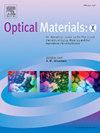Temperature-dependent luminescence of europium-doped Ga₂O₃ ceramics
Q2 Engineering
引用次数: 0
Abstract
This study explores the synthesis and luminescent properties of europium-doped gallium oxide (Ga₂O₃:Eu) ceramics fabricated via electron beam-assisted synthesis (EBAS) at 1.4 MeV. The resulting Ga₂O₃:Eu ceramics exhibit a nanocrystalline structure with an average crystallite size of ∼30 nm, high crystallinity, and minimal lattice strain (<0.5 %). Luminescence analysis from 4 K to 300 K reveals both intrinsic and europium-induced emissions. While intrinsic Ga₂O₃ emission exhibits thermal quenching above 100 K, Eu³⁺-related emissions, notably the 611 nm red emission, show thermal stability, retaining ∼90 % of their intensity at 300 K. Additionally, a novel low-temperature emission peak at 1.74 eV, potentially associated with electron beam-induced defects, was detected, meriting further exploration. These findings indicate that Ga₂O₃:Eu ceramics synthesized via EBAS hold promise for optoelectronic, radiation detection, and high-temperature applications, given their rapid production and enhanced thermal stability.
铕掺杂Ga₂O₃陶瓷的温度依赖性发光
本研究探索了在1.4 MeV下电子束辅助合成(EBAS)制备的铕掺杂氧化镓(Ga₂O₃:Eu)陶瓷的合成和发光性能。所得的Ga₂O₃:Eu陶瓷具有平均晶粒尺寸为~ 30 nm、高结晶度和最小晶格应变(< 0.5%)的纳米晶体结构。从4k到300k的发光分析显示了本征和铕诱导的发射。虽然Ga₂O₃的发射在100 K以上表现出热猝灭,但Eu³⁺相关的发射,尤其是611 nm的红色发射,表现出热稳定性,在300 K时保持了90%的强度。此外,还发现了一个新的1.74 eV低温发射峰,可能与电子束诱导缺陷有关,值得进一步探索。这些发现表明,通过EBAS合成的Ga₂O₃:Eu陶瓷由于其快速生产和增强的热稳定性,在光电、辐射检测和高温应用方面具有前景。
本文章由计算机程序翻译,如有差异,请以英文原文为准。
求助全文
约1分钟内获得全文
求助全文
来源期刊

Optical Materials: X
Engineering-Electrical and Electronic Engineering
CiteScore
3.30
自引率
0.00%
发文量
73
审稿时长
91 days
 求助内容:
求助内容: 应助结果提醒方式:
应助结果提醒方式:


